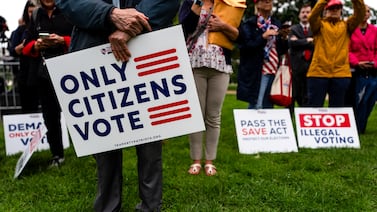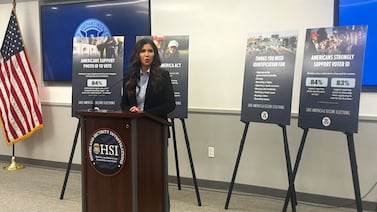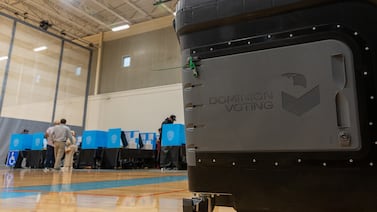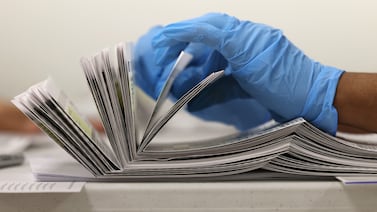Votebeat is a nonprofit news organization reporting on voting access and election administration across the U.S. Sign up for Votebeat Wisconsin’s free newsletter here.
A Republican proposal to require every Wisconsin municipality to offer early-voting hours has divided groups representing voters and election officials, with voters calling the proposal a net gain for voting access, and some clerks calling the requirements onerous, especially for small municipalities.
The bill originally required every municipality to offer at least 20 hours of in-person early voting at the clerk’s office or an alternate site. It was amended Tuesday, based on clerk feedback, to allow for fewer required hours in some smaller municipalities.
Municipalities that can’t hold their own early-voting hours would be able to offer it in a neighboring municipality or the county clerk’s office under the bill. A separate measure would provide $1.5 million to municipalities extending their early-voting hours — lowered from an originally proposed $10 million — but that would be available only for the 2025-26 fiscal year, while the early-voting requirements appear to be indefinite. The proposal would apply to the April and November elections.
Sen. Rachael Cabral-Guevara, a Republican, previously told Votebeat she wrote the bill after noticing the stark difference in early-voting availability between rural and urban municipalities. Cities such as Milwaukee and Madison offer multiple days for early voting, while some rural municipalities offer just a couple of hours, or do it by appointment only.
Cabral-Guevara didn’t directly answer a follow-up question from Votebeat on Tuesday about whether the Senate would fund the measure, but said she’s hoping it passes. Rep. Scott Krug, a Republican who wrote the bill with her, told Votebeat he hopes the Senate will pass the measure since he lowered the amount of proposed funding.
“It’s only going to create more opportunities for voting,” said Jay Heck, executive director of Common Cause Wisconsin. “That for us is always the key. It should be funded for more than one year.”
The amended bill would set the minimum early voting period at 10 hours in municipalities with fewer than 600 voters,15 hours in municipalities with between 600 and 799 voters, and 20 hours in towns with 800 or more voters.
But some clerks said any hourly requirement would be too burdensome — and could have the unintended consequence of decreasing voter access. Because Wisconsin’s elections are run at the municipal level, a small number of clerks serving only a few dozen voters would still be required to adhere to the minimum hours.
Omro Town Clerk Dana Woods called this “too drastic of a measure,” and said the requirements may lead to “honorable public servants” choosing to leave their jobs.
Most Wisconsin clerks work part-time, with some scheduled only a few hours per week. Woods, for example, is scheduled to be in her office just seven hours per week and serves 1,800 registered voters.
Lisa Tollefson, the Rock County clerk, acknowledged that the proposal could increase voting across the state but said it still doesn’t make sense in the smallest municipalities, where voters typically choose to vote on Election Day.
Joe Ruth, government affairs director at the Wisconsin Towns Association, said at a public hearing for the proposal that clerks would likely stop offering early voting by appointment if they have to fulfill the proposed hourly requirement. And if they do so, he added, the voters who can’t come during the set hours would lose their opportunity to vote early in person.
Ruth didn’t immediately respond to a request for comment about whether the amendment alleviated his concerns.
In an Assembly Elections Committee executive session, the five Republicans on the committee voted in favor and the two Democrats voted against it. It is scheduled for an Assembly floor vote on Wednesday.
Rep. Dave Maxey, who chairs the Assembly Elections Committee, called the bill a great idea and questioned why people would vote against a funded mandate that would expand voting. He said there would be a mechanism to fund early voting in future years through the budget.
Rep. Lee Snodgrass, a Democrat, told Votebeat that she voted against the bill because it allows a county board to decide whether a municipality can hold early voting hours at the county clerk’s office. She said county boards shouldn’t have oversight over elections. The latest tweak to the bill now requires consent from both the county board and clerk.
Alexander Shur is a reporter for Votebeat based in Wisconsin. Contact Alexander at ashur@votebeat.org.




